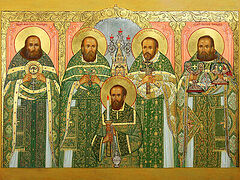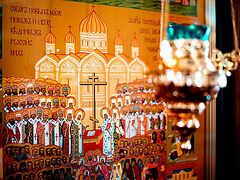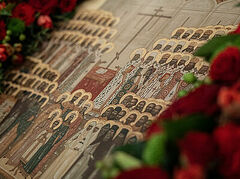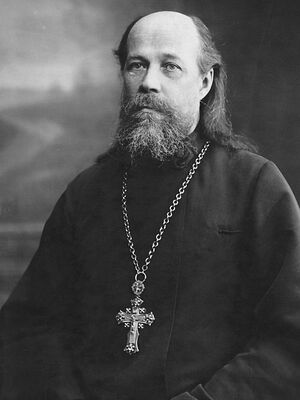 Protopresbyter Philisoph Ornatsky The truth of God is perceived by the faithful as one of the ultimate spiritual values. Blessed are those who hunger and thirst righteousness, For they shall be filled (Matthew 5:6). For Orthodox Christians, the truth spoken by the Lord in His Sermon on the Mount is no abstract notion. Christ Is Truth, and only those who hunger and thirst, who don’t wander away from God will be sated—or, in other words, saved.
Protopresbyter Philisoph Ornatsky The truth of God is perceived by the faithful as one of the ultimate spiritual values. Blessed are those who hunger and thirst righteousness, For they shall be filled (Matthew 5:6). For Orthodox Christians, the truth spoken by the Lord in His Sermon on the Mount is no abstract notion. Christ Is Truth, and only those who hunger and thirst, who don’t wander away from God will be sated—or, in other words, saved.
But how many of us feel hunger and thirst for righteousness?! It is easy to argue about the truth of God when nothing threatens your life, and a lot harder when the Church of Christ is subject to fierce persecution.
“We need to experience a crushing blow in order to awaken our sleeping conscience; to wake a sinner from his deadly sinful slumber, we should remove the scale from the blind eyes of his soul, for he can’t see the great abundance of his sins and all the strictness of God’s truth that will judge him after death. O Lord, bestow upon us the avidity and thirst of truth here and now, so that through genuine repentance, we could cast aside every falsehood and escage Your dreadful and righteous Judgment!” said St. John of Kronstadt.
The life and death of the holy hieromartyr Philosoph Nikolayevich Ornatsky, whose memory the Orthodox Church commemorates on June 13, was an act of the profession of faith for the Church and Christ.
It is fitting to remember this warrior of Christ today in particular, because in these difficult and trying times for our Holy Church, the moral choice we make now will decide our lot in eternity.
He who seeks the Truth
When a boy was born to a family of a village priest surnamed Ornatsky, stemming from a long line of priests in the Nizhny Novgorod Governorate, he received the name Philosoph, an odd choice for country folk. That was how the boy’s father expressed his reverence to the holy fathers of the earliest times who defended the teaching of Christ before the pagans.
Philosoph followed in his father’s footsteps: Upon his graduation from the St. Petersburg Theological Academy with the degree of the candidate of theology, he was ordained and served as a rector of the Church in honor of the “Assuage My Sorrow” Icon of the Mother of God until he was elected to represent the clergy in the St. Petersburg City Duma. Having taken upon himself the ministry of caring for the poor, he organized overnight shelters, homes for orphans and the disabled, hospitals for the poor, and almshouses for the elderly. Besides that, he also managed to find time to supervise the construction of churches in St. Petersburg. Owing to the priest’s untiring efforts, twelve magnificent churches, with their own spiritual and educational centers and various charities, were erected in the former capital of the Russian Empire, as well as in its environs. The priest’s enormous number of good deeds may seem incredible, yet archival documents give us proof. All his undertakings for the sake of the Church were blessed by Righteous John of Kronstadt, who was Philosoph Nikolayevich Ornatsky’s spiritual father for twenty years.
The year 1894… The religious and moral foundations of Russian society began to falter more and more, and the ideas of Bolshevism, which Fr. Philosoph considered ruinous, gained increasing popularity. Unable to keep silent, he openly addressed the residents of St. Petersburg:
“Look: Here Christian life is being shattered at its foundations. Religion and faith are proclaimed as obsolete; the people have elevated mankind in place of God, and instead of serving God, they want to serve man. The spiritual world is being declared non-existent, and the angels of good and evil to which the Holy Gospel attests so expressly and resolutely are being considered no more than our notions of right and wrong... There are people these days who don’t consider marriage a moral union made for the mutual salvation of husband and wife and the Christian upbringing of children, but instead they transform it into a simple transaction for the sake of sensual pleasure and convenience… As we were slumbering spiritually, concentrating our attention on earthly cares and things, the enemy of mankind was busy ensnaring the simple-minded, and, pointing at our weaknesses, he has incited their hatred towards us. And so we are now facing our enemy who, through fellow Christians enslaved by sin, inflicts wounds upon us. A real battle awaits us—not against men of flesh and blood, but against the principalities, against powers, against the rulers of the darkness of this age, against spiritual hosts of wickedness in the heavenly places (cf. Ephesians 6:12).
With the beginning of the First World War, Fr. Philosoph gave up his home to be used as a hospital for wounded soldiers and moved his family to a small government flat. They led a very modest life. The head of the family even had to offer private lessons to provide for his wife and ten children. He was rector of the Kazan Cathedral at the time; thousands of people who genuinely sought salvation found their spiritual mentor in Fr. Philosoph.
1917…
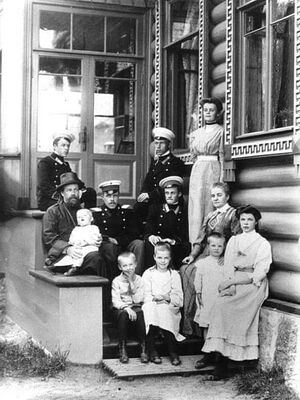 Fr. Philosoph Ornatsky with his family The chaos of the revolution that swept across the country caused discord in the Orthodox Church: Some advocated for reform and “democracy,” while others called to defend the Truth of Christ.
Fr. Philosoph Ornatsky with his family The chaos of the revolution that swept across the country caused discord in the Orthodox Church: Some advocated for reform and “democracy,” while others called to defend the Truth of Christ.
Having turned the truth inside out, the new authorities assumed their monopoly over it as well. False reporting on dissidents became known as the highest expression of “truthfulness,” whereas those resisting the “revolutionary truth” were declared “enemies of the people” and executed en masse. The legacy of such “truth” would later affect a whole generation of the people who, following the revolutionary coup, set about building the “bright future” that had no place left for God.
Every person of that era was facing a moral dilemma: What “truth” will he defend?!
With the blessing of Patriarch Tikhon, on January 24, 1918 Archpriest Philosoph Ornatsky made a report at the Church Council about the attempt by Bolsheviks to take over the Alexander Nevsky Lavra in Petrograd and suggested that a mass procession with the cross be held. Recognizing that the “Bolshevik truth” is in fact a state-funded terror and keeping in mind that he only recently has served the panikhida service in the Kazan Cathedral for the brutally killed Archpriest John Kochurov, whose death as a passion bearer was the first among a host of new martyrs of Russia in the twentieth century, Ornatsky openly and courageously announced:
“It is time for us to say that the thieves have seized power and have control over us. We had patience, but we can’t bear it any longer because it affected the Holy Church, the Holy of Holies of the Russian soul… We shouldn’t deliberately become martyrs; but if we have to suffer or even die for truth, we will have to do it. The procession with the cross will prove to everyone that the faithful are coming together. The clergy must preach to their flock not only on feast days, but at every moment possible and anywhere they can! Everyone should say that we must defend the holy faith! <…> It is high time for the clergy to join hands with the people. If the Lavra is protected, it is because of our people. If we fight for our Church, we will do it with the assistance of the people...”
In August 1918, priest Philosoph Ornatsky and two of his sons, Nikolai (a military doctor, aged 32) and Boris (Junior Captain of the Artillery, aged 31), were arrested. It is presumed that they were executed on October 30, 1918. Their bodies were thrown into the Gulf of Finland.
Valery Filimonov, the author of the books on the martyrdom of Philosoph Ornatsky, in his description of his final journey to the place of execution, noted that the priest was a worthy example of a warrior for Christ who was ready to accept death for Truth.
In an attempt to console his fellow martyrs for the faith (there were about thirty of them), Fr. Philosoph meekly told them before the execution: “There we go, we are going to be with the Lord. Now, accept my blessing and hear the holy prayers.” When the executioners asked him shamelessly: “Who should we kill first—you, or your sons?” “My sons!” was his answer. And… as they were killing Nikolai and Boris, their father, on bent knees, fervently prayed for the repose of their souls, reading the last rites.
The tragic nature of this scene so shook the Red Army soldiers that the platoon refused to shoot the kneeling priest. Even the Chinese soldiers refused to do it. Then, a young commissar himself came up to the priest and shot him point-blank.
To acquire Heaven, we must learn to defend the Truth of Christ on earth without any fear—Heaven begins here on earth!
Hieromonk Roman (Matyushin), moved by the fortitude and the act of faith of the God-loving men, wrote a poem that radiates the unfading light of the Truth of God that granted eternity to the martyrs.
“They sent the bullet through his head for the faith in God”
As judged by that disgraceful court:
A bullet in his head – for burning love of God.
His executioners even joked:
You choose, priest: who goes first?”
“It will be as you say—
You first or those two sons?”
“Thanks just the same, folks, yes.
Let it be them who first meet their death.
“My children, do not fear, for death is quick as thought,
I send you there, to our Christ,
But death for Him is gloriously dear,
And too am bound soon to be with you.”
A shot rang out, well-aimed and well-directed,
His sons fell quietly.
Their father prayed the last rite, for them and for himself,
“Well, my job is finished. Now do yours.
There is no need to cherish life;
The Lord has blessed your crowns.
O, thrice blessed martyrs! O, the loftiness of holy Love!

